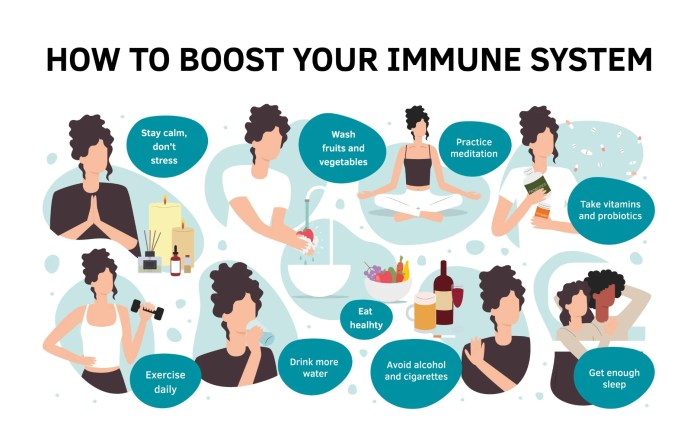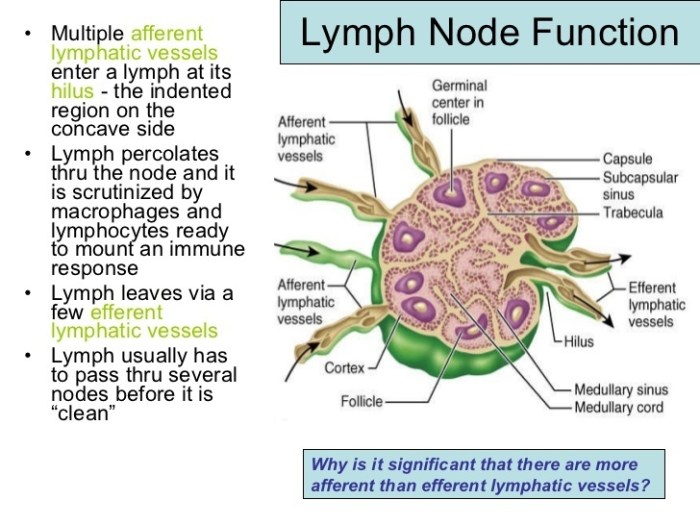Exercise 35 the lymphatic system and immune response – As we delve into the intricate workings of the lymphatic system and immune response, this exploration unravels a captivating narrative of defense and resilience. Exercise 35 embarks on a journey to elucidate the structure, function, and profound role of the lymphatic system in orchestrating immunity, ensuring the body’s unwavering defense against pathogens.
Through an in-depth examination of immune cells, adaptive and innate immunity, and the impact of immune disorders, this discourse unveils the profound significance of the lymphatic system in safeguarding our well-being.
The Lymphatic System and Its Role in Immunity
The lymphatic system is a complex network of tissues and organs that plays a crucial role in maintaining fluid balance, absorbing and transporting fats, and supporting the immune response. It consists of a network of lymphatic vessels, lymph nodes, and lymphoid tissues located throughout the body.
The lymphatic system functions by collecting excess fluid, known as lymph, from tissues and returning it to the bloodstream. Lymph contains waste products, bacteria, and other foreign substances that are filtered out by lymph nodes. These nodes contain specialized immune cells that recognize and destroy pathogens, preventing them from entering the bloodstream.
The Lymphatic System and Immune Defense, Exercise 35 the lymphatic system and immune response
The lymphatic system is a key component of the immune system, providing both innate and adaptive immune responses.
- Innate Immunity:The lymphatic system supports innate immunity by filtering out pathogens and producing antimicrobial substances. Lymph nodes act as a barrier, trapping and destroying pathogens before they can spread throughout the body.
- Adaptive Immunity:The lymphatic system plays a crucial role in initiating and regulating adaptive immune responses. Lymph nodes contain specialized cells called B cells and T cells that recognize and respond to specific antigens. These cells produce antibodies and orchestrate cellular immune responses to eliminate pathogens.
The Lymphatic System and Specific Immune Cells

The lymphatic system houses a variety of immune cells that play distinct roles in the immune response.
Types of Immune Cells in the Lymphatic System
- B cells:Produce antibodies that recognize and bind to specific antigens, leading to the neutralization and destruction of pathogens.
- T cells:Recognize and destroy infected cells or abnormal cells within the body, providing cellular immunity.
- Macrophages:Phagocytic cells that engulf and destroy pathogens, cellular debris, and foreign substances.
- Dendritic cells:Capture and present antigens to immune cells, initiating immune responses.
- Natural killer cells:Destroy infected cells and tumor cells without prior sensitization.
The Lymphatic System and Adaptive Immunity

Adaptive immunity allows the body to develop specific immune responses against specific pathogens. The lymphatic system plays a vital role in this process.
When an antigen is encountered, dendritic cells capture and present it to T cells in lymph nodes. Activated T cells then proliferate and differentiate into effector T cells, which can directly kill infected cells or help B cells produce antibodies.
The lymphatic system provides a specialized environment for the development and maturation of immune cells, enabling them to recognize and respond to a wide range of pathogens.
The Lymphatic System and Innate Immunity

Innate immunity provides a rapid and non-specific response to pathogens. The lymphatic system supports innate immune responses in several ways:
- Filtering and Trapping Pathogens:Lymph nodes and lymphatic vessels filter out pathogens, preventing them from spreading throughout the body.
- Production of Antimicrobial Substances:Lymph nodes produce antimicrobial substances, such as cytokines and chemokines, that directly kill pathogens or attract immune cells to the site of infection.
- Phagocytosis:Macrophages and other phagocytic cells in the lymphatic system engulf and destroy pathogens.
The Lymphatic System and Immune Disorders: Exercise 35 The Lymphatic System And Immune Response

Dysfunction of the lymphatic system can lead to various immune disorders.
Common Immune Disorders Associated with the Lymphatic System
- Lymphedema:Accumulation of lymph fluid in tissues due to impaired lymphatic drainage, leading to swelling and discomfort.
- Lymphoma:Cancer of the lymphatic system, characterized by uncontrolled proliferation of lymphocytes.
- Immunodeficiency Disorders:Conditions in which the lymphatic system is unable to mount an effective immune response, leading to increased susceptibility to infections.
- Autoimmune Disorders:Conditions in which the immune system mistakenly attacks the body’s own tissues, potentially involving the lymphatic system.
Understanding the role of the lymphatic system in immune function is crucial for diagnosing and treating these disorders.
Detailed FAQs
What is the primary function of the lymphatic system?
The lymphatic system is responsible for draining excess fluid from tissues, filtering out waste products and pathogens, and transporting immune cells throughout the body.
How does the lymphatic system contribute to the immune response?
The lymphatic system contains lymph nodes, which are sites where immune cells gather to identify and attack pathogens. It also produces antibodies and other immune factors that help the body fight infection.
What are the different types of immune cells found in the lymphatic system?
The lymphatic system contains a variety of immune cells, including lymphocytes (T cells, B cells, and natural killer cells), macrophages, and dendritic cells.